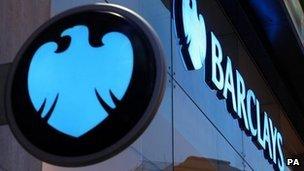Barclays hits back against tax scheme claims
- Published

Retrospective legislation was introduced by the government to close the tax loopholes
Barclays has criticised the government for accusing it of using schemes that were intended to avoid substantial amounts of tax.
In February, Barclays was accused by HM Revenue and Customs of avoiding paying £500m of tax.
The government took the unusual step of introducing retrospective legislation.
<link> <caption>In a letter to the Treasury Select Committee</caption> <url href="http://www.parliament.uk/business/committees/committees-a-z/commons-select/treasury-committee/news/hhhh/" platform="highweb"/> </link> , Barclays boss Bob Diamond said the attack on Barclays was "completely unwarranted".
In his Budget speech, Chancellor George Osborne described tax avoidance as "morally repugnant" and announced plans to introduce a general anti-avoidance rule.
Mr Diamond noted that the bank had disclosed its use of the tax avoidance schemes to HMRC voluntarily and was particularly annoyed that Mr Osborne described Barclays as "highly abusive".
"Barclays absolutely respects the right of HMRC and the government to decide to adjust the tax laws," Mr Diamond wrote in his letter, dated 15 May and released on Monday.
"However, the way in which the situation was handled seems to us to have been completely unwarranted.
"Unnecessary damage was placed on Barclays reputation just at a time when the focus should be on rebuilding confidence and accelerating growth."
A Treasury spokesperson said the they had received the letter and were considering their response.
Two schemes
Tax rules forced the bank to tell the authorities about its plans.
One tax scheme involved Barclays claiming it should not have to pay corporation tax on profits made when buying back its own IOUs.
The second tax avoidance scheme, also designed by Barclays, involved investment funds claiming that non-taxable income entitled the funds to tax credits that could be reclaimed from HMRC.
Mr Diamond was also annoyed that the bank had been singled out, feeling that its confidentiality had been breached.
"We believe that the confidentiality of taxpayers' affairs is an important principle of UK tax law that has stood for many years" and "it is important to the UK's reputation as a business centre that this principle is not seen to be compromised or watered down".
Barclays disclosed the two schemes to the tax authorities under rules that have been in place since 2004.
Anyone, such as a bank, accountant, lawyer or tax adviser, who devises a seemingly legal tax avoidance plan, is obliged to tell the tax authorities about it within a few days of using it or marketing it to clients.
More than 2,000 schemes have been disclosed in the past eight years.